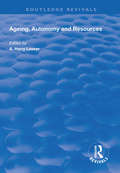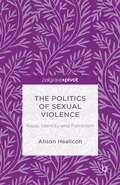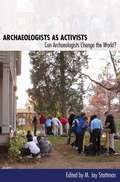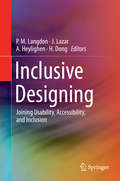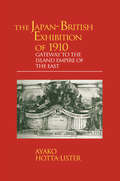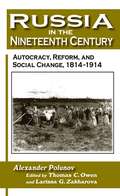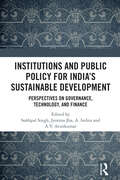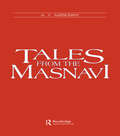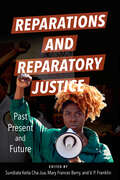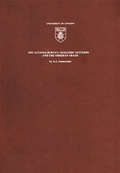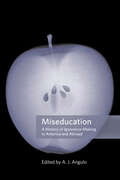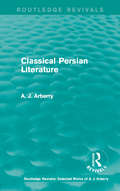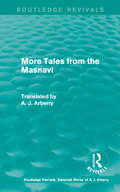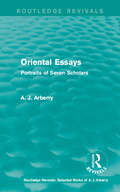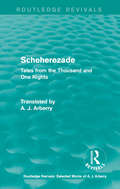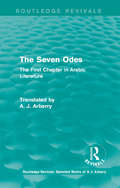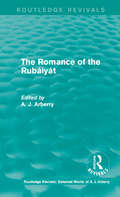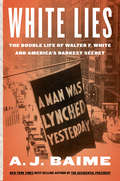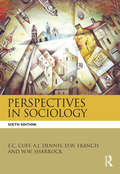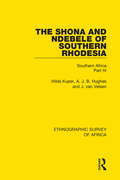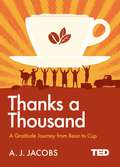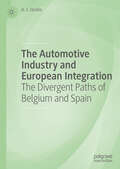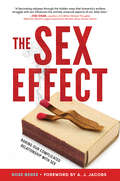- Table View
- List View
Ageing, Autonomy and Resources (Routledge Revivals)
by A. Harry LesserFirst Published in 1999, lesser collects fourteen papers to create a discourse on the practical importance in a society where the proportion of elderly people is increasing. Exploring how autonomy and how it should be defined, and ethically when is it right to preserve a person’s autonomy and in comparison is it ever ethically right to bring elderly peoples autonomy as a secondary concern is it saves them from harm?
The Politics of Sexual Violence: Rape, Identity and Feminism
by A. HealiconWith the recent media interest in celebrity childhood sexual abuse and rape cases, we think we know what sexual violence is and who 'rape victims' are. But this portrayal is limited. Drawing on in-depth accounts from women who have experienced rape, this book revisits issues of credibility, responsibility and feminism to provide missing details.
Archaeologists As Activists: Can Archaeologists Change The World?
by Sarah Miller A. Henderson M. Stottman Stephen McBride Carol McDavid Matthew Prybylski Lois Stahlgren Jodi Barnes Robert Chidester Kim Christensen David Gadsby Patrice Jeppson Barbara Little Kim McBrideCould archaeologists benefit contemporary cultures and be a factor in solving world problems? Can archaeologists help individuals? Can archaeologists change the world? These questions form the root of “archaeology activism” or “activist archaeology”: using archaeology to advocate for and affect change in contemporary communities. <p><p> Archaeologists currently change the world through the products of their archaeological research that contribute to our collective historical and cultural knowledge. Their work helps to shape and reshape our perceptions of the past and our understanding of written history. Archaeologists affect contemporary communities through the consequences of their work as they become embroiled in controversies over negotiating the past and the present with native peoples. Beyond the obvious economic contributions to local communities caused by heritage tourism established on the research of archaeologists at cultural sites, archaeologists have begun to use the process of their work as a means to benefit the public and even advocate for communities. <p> In this volume, Stottman and his colleagues examine the various ways in which archaeologists can and do use their research to forge a partnership with the past and guide the ongoing dialogue between the archaeological record and the various contemporary stakeholders. They draw inspiration and guidance from applied anthropology, social history, public history, heritage studies, museum studies, historic preservation, philosophy, and education to develop an activist approach to archaeology—theoretically, methodologically, and ethically.
Inclusive Designing
by P. M. Langdon J. Lazar A. Heylighen H. Dong'Inclusive Designing' presents the proceedings of the seventh Cambridge Workshop on Universal Access and Assistive Technology (CWUAAT '14). It represents a unique multi-disciplinary workshop for the Inclusive Design Research community where designers, computer scientists, engineers, architects, ergonomists, policymakers and user communities can exchange ideas. The research presented at CWUAAT '14 develops methods, technologies, tools and guidance that support product designers and architects to design for the widest possible population for a given range of capabilities, within a contemporary social and economic context. In the context of developing demographic changes leading to greater numbers of older people and people with disabilities, the general field of Inclusive Design Research strives to relate the capabilities of the population to the design of products. Inclusive populations of older people contain a greater variation in sensory, cognitive and physical user capabilities. These variations may be co-occurring and rapidly changing leading to a demanding design environment. Recent research developments have addressed these issues in the context of: governance and policy; daily living activities; the workplace; the built environment, Interactive Digital TV and Mobile communications. Increasingly, a need has been identified for a multidisciplinary approach that reconciles the diverse and sometimes conflicting demands of Design for Ageing and Impairment, Usability and Accessibility and Universal Access. CWUAAT provides a platform for such a need. This book is intended for researchers, postgraduates, design practitioners, clinical practitioners, and design teachers.
The Japan-British Exhibition of 1910: Gateway to the Island Empire of the East
by A. Hotta-ListerThe rapid development of Japan at the turn of the last century, including the defeat of Russia in 1904-5, intrigued the western Imperial powers, but also aroused reactions of contempt and suspicion. Britain was the most important of the powers upon which Japan earnestly wished to impress herself to mitigate the rising tide of anti-Japanese sentiment. An exhibition in London, therefore, was seen as a timely event by the Meiji Government to advance Japanese agendas in political, economic and educational terms. This is the first major study of this remarkable venture, fully reviewed and documented, and concerned principally with the Japanese side of the story.
Russia in the Nineteenth Century: Autocracy, Reform, and Social Change, 1814-1914 (The\new Russian History Ser.)
by A. I. Polunov Thomas C. Owen L. G ZakharovaThis is a comprehensive interpretive history of Russia from the defeat of Napoleon to the eve of World War I. It is the first such work by a post-Soviet Russian scholar to appear in English. Drawing on the latest Russian and Western historical scholarship, Alexander Polunov examines the decay of the two central institutions of tsarist Russia: serfdom and autocracy. Polunov explains how the major social groups - the gentry, merchants, petty townspeople, peasants, and ethnic minorities - reacted to the Great Reforms, and why, despite the emergence of a civil society and capitalist institutions, a reformist, evolutionary path did not become an alternative to the Revolution of 1917. He provides detailed portraits of many tsarist bureaucrats and political reformers, complete with quotations from their writings, to explain how the principle of autocracy, although significantly weakened by the Great Reforms in mid-century, reasserted itself under the last two emperors. Polunov stresses the relevance, for Russians in the post-Soviet period, of issues that remained unresolved in the pre-Revolutionary period, such as the question of private property in land and the relationship between state regulation and private initiative in the economy.
Institutions and Public Policy for India’s Sustainable Development: Perspectives on Governance, Technology, and Finance
by Sukhpal Singh Jyotsna Jha A. Indira A. V. ArunkumarSustainable development has emerged as an overarching concern globally. Given the challenges of climate change, national economies, especially in the developing world, face unsustainable levels and patterns of growth and development. This volume looks at how India’s sustainable development has progressed through institutional changes and public policy discourse. It studies the three pillars of sustainability – technology, governance, and finance. The authors examine whether institutions have been able to work towards becoming inclusive and participatory and whether public policy can remain relevant and agile in a fast-changing world to ensure sustainable development.Written in honour of Professor Vinod Vyasulu, an erudite economist with wide-ranging interests, this volume will be of interest to academics and practitioners engaged with issues of development, policy, institutions, and technology in the fields of Economics, Sociology, Development Studies, Public Policy, and South Asian Studies.
Tales from the Masnavi (Routledge Revivals: Selected Works Of A. J. Arberry Ser. #6)
by A. J ArberryThe Masnavi of Jalal al-Din Rumi (1207-1273), a massive poem of some 25,000 rhyming couplets, by common consent ranks among the world's greatest masterpieces of religious literature. The material which makes up the Masnavi is divisible into two different categories: theoretical discussion of the principal themes of Sufi mystical life and doctrine, and stories of fables intended to illustrarte those themes as they arise. This selection of tales is the most accessible introduction to this giant epic for the non-perisan reader.
Reparations and Reparatory Justice: Past, Present, and Future
by V. P. Franklin Mary Frances Berry Chuck Collins Danny Glover Brian Jones Charles P. Henry Earl Ofari Hutchinson James B Stewart Ron Daniels Sundiata Keita Cha-Jua A. J Davis Jesse Jackson Sr Sheila Jackson Lee Kamm Howard Hilary McDonald Beckles National Coalition of Blacks for Reparations in America New Afrikan Peoples Organization/Malcolm X Grassroots Movement Malcolm X Grassroots Movement National African American Reparations Commission Adom Gretachew Dedrick Asante-MuhammadChanges at the global, federal, state, and municipal level are pushing forward the reparations movement for people of African descent. The distinguished editors of this volume have gathered works that chronicle the historical movement for reparations both in the United States and around the world. Sharing a focus on reparations as an issue of justice, the contributors provide a historical primer of the movement; introduce the philosophical, political, economic, legal and ethical issues surrounding reparations; explain why government, corporations, universities, and other institutions must take steps to rehabilitate, compensate, and commemorate African Americans; call for the restoration of Black people’s human and civil rights and material and psychological well-being; lay out specific ideas about how reparations can and should be paid; and advance cutting-edge interpretations of the complex long-lasting effects that enslavement, police and vigilante actions, economic discrimination, and other behaviors have had on people of African descent. Groundbreaking and innovative, Reparations and Reparatory Justice offers a multifaceted resource to anyone wishing to explore a defining moral issue of our time. Contributors: Dedrick Asante-Muhammad, Hilary McDonald Beckles, Mary Frances Berry, Sundiata Keita Cha-Jua, Chuck Collins, Ron Daniels, V. P. Franklin, Danny Glover, Adom Gretachew, Charles Henry, Kamm Howard, Earl Ofari Hutchinson, Jesse Jackson, Sr., Brian Jones, Sheila Jackson Lee, James B. Stewart, the Movement 4 Black Lives, the National African American Reparations Commission, the National Coalition of Blacks for Reparations in America, the New Afrikan Peoples Organization/Malcolm X Grassroots Movement
The Acconia Survey: Neolithic Settlement and the Obsidian Trade
by A. J. AmmermanReport of a key survey of archaeological sites in the southern toe of Italy to discover Neolithic sites and documenting prehistoric trade in obsidian.
Miseducation: A History of Ignorance-Making in America and Abroad
by A. J. AnguloA provocative collection that explores how intentional ignorance seeps into formal education.Honorable Mention for the PROSE Education Theory Award of the Association of American PublishersIgnorance, or the study of ignorance, is having a moment. Ignorance plays a powerful role in shaping public opinion, channeling our politics, and even directing scholarly research. The first collection of essays to grapple with the historical interplay between education and ignorance, Miseducation finds ignorance—and its social production through naïveté, passivity, and active agency—at the center of many pivotal historical developments. Ignorance allowed Americans to maintain the institution of slavery, Nazis to promote ideas of race that fomented genocide in the 1930s, and tobacco companies to downplay the dangers of cigarettes. Today, ignorance enables some to deny the fossil record and others to ignore climate science. A. J. Angulo brings together seventeen experts from across the scholarly spectrum to explore how intentional ignorance seeps into formal education. Each chapter identifies education as a critical site for advancing our still-limited understanding of what exactly ignorance is, where it comes from, and how it is diffused, maintained, and regulated in society.Miseducation also challenges the notion that schools are, ideally, unimpeachable sites of knowledge production, access, and equity. By investigating how laws, myths, national aspirations, and global relations have recast and, at times, distorted the key purposes of education, this pathbreaking book sheds light on the role of ignorance in shaping ideas, public opinion, and policy.
Routledge Revivals: Classical Persian Literature (Routledge Revivals: Selected Works of A. J. Arberry #3)
by A. J. ArberryFirst published in 1958, this work by one of Britain’s most celebrated Orientalist scholars, tells the story of the rebirth of national literature in Persia after the fall of the Sᾱsᾱnian empire in the seventh century. It traces the course of this literature’s development and full maturity from the ninth century to the end of the fifteenth century and looks at a number of important writers including the Saljῡq poets, Rῡmῑ, ῌᾱfiz and Jᾱmῑ. This work will be of interest to those studying Persian and Middle-Eastern literature and history.
Routledge Revivals: More Tales from the Masnavi (Routledge Revivals: Selected Works of A. J. Arberry #6)
by A. J. ArberryFirst published in 1963, this work puts into clear and rhythmical English one hundred stories and apologues of the Masnavi of Rumi. Composed over a period of many years during the thirteenth century, as a manual of instruction and initiation into spiritual life, the Masnavi has long been acclaimed the greatest mystical epic of Islam. The tales were designed to illustrate in human terms the often complex doctrine, and this they do with a wealth of beauty, honour and pathos, as appealing to the modern reader as to the medieval audience to which they were originally addressed. The volume, like its predecessor Tales of the Masnavi, is included in the UNESCO list of representative great works of world literature. This work will be of interest to those studying Islam and Middle Eastern literature.
Routledge Revivals: Portraits of Seven Scholars (Routledge Revivals: Selected Works of A. J. Arberry #5)
by A. J. ArberryFirst published in 1960, this work describes the lives and labours of six great scholars - Simon Ockley, Sir William Jones, E. W. Lane, E. H. Palmer, E.G. Browne and R. A Nicholson. These men were devoted to building a bridge between the peoples and cultures of Europe and Asia. To these biographical essays, Arberry has added a short autobiography and an eloquent plea for the further encouragement of Oriental studies. This book will be of interest to those studying Middle-Eastern studies and the history of Orientalist study.
Routledge Revivals: Tales from the Thousand and One Nights (Routledge Revivals: Selected Works of A. J. Arberry #1)
by A. J. ArberryFirst published in 1953, this translation of part of the Arabian Nights by A. J. Arberry offers four famous stories in modern idiom: Aladdin, Judar, Aboukir and Abousir, and the Amorous Goldsmith. The introduction provides a brief analysis of earlier translations of the tales and explains their value as indicators of the society in which they were written. This work will be of interest to those studying Middle-Eastern literature and history.
Routledge Revivals: The First Chapter in Arabic Literature (Routledge Revivals: Selected Works of A. J. Arberry #2)
by A. J. ArberryThese seven poems, translated by A. J. Arberry in 1957, are the most famous survivors of a vast mass of poetry produced in the Arabian Desert in the sixth century. Arberry’s introduction explains to the reader what was known about the poems and how they came to be preserved and distributed over time. The epilogue particularly interrogates the authenticity of the poems and tracks how they have been transmitted over time. This work will be of interest to those studying Persian and Middle-Eastern literature and history.
Routledge Revivals: The Romance of the Rubáiyát (Routledge Revivals: Selected Works of A. J. Arberry)
by A. J. ArberryFirst published in 1959, this reprint of the first edition of Edward FitzGerald’s translation of the Rubáiyát is accompanied by an introduction and notes by A J Arberry, one of Britain’s most distinguished Orientalist scholars. The Rubáiyát is a selection of poems written in Persian attributed to Omar Khayyám. The work will be of interest to those studying Middle Eastern Literature.
White Lies: The Double Life of Walter F. White and America's Darkest Secret
by A. J. BaimeA riveting biography of Walter F. White, a little-known Black civil rights leader who passed for white in order to investigate racist murders, help put the NAACP on the map, and change the racial identity of America forever Walter F. White led two lives: one as a leader of the Harlem Renaissance and the NAACP in the early twentieth century; the other as a white newspaperman who covered lynching crimes in the Deep South at the blazing height of racial violence. Born mixed race and with very fair skin and straight hair, White was able to &“pass&” for white. He leveraged this ambiguity as a reporter, bringing to light the darkest crimes in America and helping to plant the seeds of the civil rights movement. White&’s risky career led him to lead a double life. He was simultaneously a second-class citizen subject to Jim Crow laws at home and a widely respected professional with full access to the white world at work. His life was fraught with internal and external conflict—much like the story of race in America. Starting out as an obscure activist, White ultimately became Black America&’s most prominent leader. A character study of White&’s life and career with all these complexities has never been rendered, until now. By the award-winning, best-selling author of The Accidental President,Dewey Defeats Truman, and The Arsenal of Democracy,White Lies uncovers the life of a civil rights leader unlike any other.
Perspectives in Sociology
by E. C. Cuff A. J. Dennis D. W. Francis W. W. SharrockFrom its first edition in 1979, Perspectives in Sociology has provided generations of undergraduates with a clear, reassuring introduction to the complications of sociological theory. This revised and updated edition features: a completely rewritten general introduction and conclusion; all-new introductions to each part, clarifying how each one builds on what came before; an updated set of formative questions at the end of each chapter; a comprehensive glossary of key terms. While retaining its emphasis and wealth of information on the founding figures of sociology, this sixth edition includes new tools that will allow students from related disciplines to access relevant sociological material quickly.
Data Analysis Using SAS Enterprise Guide
by Lawrence S. Meyers Glenn Gamst A. J. GuarinoThis book presents the basic procedures for utilizing SAS Enterprise Guide to analyze statistical data. SAS Enterprise Guide is a graphical user interface (point and click) to the main SAS application. Each chapter contains a brief conceptual overview and then guides the reader through concrete step-by-step examples to complete the analyses. The eleven sections of the book cover a wide range of statistical procedures including descriptive statistics, correlation and simple regression, t tests, one-way chi square, data transformations, multiple regression, analysis of variance, analysis of covariance, multivariate analysis of variance, factor analysis, and canonical correlation analysis. Designed to be used either as a stand-alone resource or as an accompaniment to a statistics course, the book offers a smooth path to statistical analysis with SAS Enterprise Guide for advanced undergraduate and beginning graduate students, as well as professionals in psychology, education, business, health, social work, sociology, and many other fields.
Data Analysis Using SAS Enterprise Guide
by Lawrence S. Meyers Glenn Gamst A. J. Guarino Lawrence S. Meyers Glenn GamstThis book presents the basic procedures for utilizing SAS Enterprise Guide to analyze statistical data. SAS Enterprise Guide is a graphical user interface (point and click) to the main SAS application. Each chapter contains a brief conceptual overview and then guides the reader through concrete step-by-step examples to complete the analyses. The eleven sections of the book cover a wide range of statistical procedures including descriptive statistics, correlation and simple regression, t tests, one-way chi square, data transformations, multiple regression, analysis of variance, analysis of covariance, multivariate analysis of variance, factor analysis, and canonical correlation analysis. Designed to be used either as a stand-alone resource or as an accompaniment to a statistics course, the book offers a smooth path to statistical analysis with SAS Enterprise Guide for advanced undergraduate and beginning graduate students, as well as professionals in psychology, education, business, health, social work, sociology, and many other fields.
The Shona and Ndebele of Southern Rhodesia: Southern Africa Part IV
by Hilda Kuper A. J. Hughes J. van VelsenRoutledge is proud to be re-issuing this landmark series in association with the International African Institute. The series, published between 1950 and 1977, brings together a wealth of previously un-co-ordinated material on the ethnic groupings and social conditions of African peoples. Concise, critical and (for its time) accurate, the Ethnographic Survey contains sections as follows: Physical Environment Linguistic Data Demography History & Traditions of Origin Nomenclature Grouping Cultural Features: Religion, Witchcraft, Birth, Initiation, Burial Social & Political Organization: Kinship, Marriage, Inheritance, Slavery, Land Tenure, Warfare & Justice Economy & Trade Domestic Architecture Each of the 50 volumes will be available to buy individually, and these are organized into regional sub-groups: East Central Africa, North-Eastern Africa, Southern Africa, West Central Africa, Western Africa, and Central Africa Belgian Congo. The volumes are supplemented with maps, available to view on routledge.com or available as a pdf from the publishers.
Thanks A Thousand: A Gratitude Journey (TED 2)
by A. J. JacobsBestselling author A.J. Jacobs has undergone a life-changing and entertaining journey. The idea is deceptively simple: he takes one of our greatest pleasures- our morning cup of coffee - and tries to thank every single person involved in making it, from the barista to the coffee farmer and all those in between. This turns out to be a stunningly large number, including artists, chemists, presidents, mechanics, biologists, miners, smugglers and goatherds. Hundreds of people. Thousands. Maybe more. Through this seemingly straightforward quest, Jacobs reveals inspiring truths. The book is a reminder of the amazing interconnectedness of our world. It shows us how much we take for granted. It teaches us how gratitude can make our lives happier, kinder and more impactful. And it will inspire readers to follow their own "Gratitude Trails." Gratitude was not an emotion that came easily to Jacobs. His innate disposition is more Larry David than Tom Hanks. But he knew that gratitude is perhaps the most important key to human happiness, the chief of all virtues, as Cicero said. Science has shown gratitude’s benefits are legion: it helps you sleep, improves your diet, and makes you more likely to recover from illnesses. Jacobs wanted to inspire his kids to embrace gratitude, so he decided to commit himself to a radical experiment. Over the course of several months, Jacobs went on a journey that took him across continents and up and down the social ladder. He experienced joy, wonder, guilt and depression. He met great characters. He learned just how far-flung are those involved – from the Minnesota miners who get the iron that makes the steel that makes the coffee roasters, to the Madison Avenue marketers who captured his wandering attention for a moment. His adventures include: A trip to a remote farm in Colombia, where he experienced first-hand how challenging it is to pick the coffee fruits. Several days with a coffee taster who taught Jacobs the secrets of the trade, and schooled him in the vocabulary that rivals wine sommeliers. (The taster doesn’t just detect notes of apple in his coffee. He says what kind of apple -- Gala? Honeycrisp?) Because coffee is 98.4 percent water, Jacobs visited the vast upstate reservoirs that supply New York City, and thanked the folks whose homes were destroyed to make way for the lakes. Jacobs devotes a chapter on the cup-makers, including the rags-to-riches inventor of the “Java Jacket,” that underappreciated cardboard ring you slip over your cup. It has saved millions of fingers and thumbs from burning discomfort, but we never give it a second thought. The food safety inspectors, who keep our coffee free from an alarming number of diseases and creatures. Along with entertaining tales, the book is filled with wonderful insights and useful tips. Readers learn how to focus on the hundreds of things that go right every day instead of the handful that go wrong. They read about our culture’s dangerous overemphasis on individuals instead of teams. They learn the art of “savouring meditation”. They learn the pros and cons of globalism. They learn to appreciate the astounding work it takes to create even the most simple items in our lives. There’s even a gratitude hack to help them fall asleep.
The Automotive Industry and European Integration: The Divergent Paths of Belgium and Spain
by A. J. JacobsThis book chronicles the divergent growth trends in car production in Belgium and Spain. It delves into how European integration, high wages, and the demise of GM and Ford led to plant closings in Belgium. Next, it investigates how lower wages and the expansion strategies of Western European automakers stimulated expansion in the Spanish auto industry. Finally, it offers three alternate scenarios regarding how further EU expansion and Brexit may potentially reshape the geographic footprint of European car production over the next ten years. In sum, this book utilizes history to help expand the knowledge of scholars and policymakers regarding how European integration and Brexit may impact future auto industry investment for all EU nations.
The Sex Effect: Baring Our Complicated Relationship with Sex
by A. J. Jacobs Ross BenesA gripping exploration of the relationship between sex and our society, with a foreword by bestselling author A.J. JacobsWhy do political leaders become entangled in so many sex scandals? How did the U.S. military inadvertently help make San Francisco a mecca of gay culture? And what was the original purpose of vibrators? Find out the answers to all these questions and more as journalist Ross Benes delves into the complicated relationship between everyday human life—including religion, politics, and technology—and our sexuality.Drawing on history, psychology, sociology, and more, The Sex Effect combines innovative research and analysis with captivating anecdotes to reveal just how much sex shapes our society—and what it means for us as humans as we continue to struggle with the wide-ranging effects our sexuality has on the world around us.
